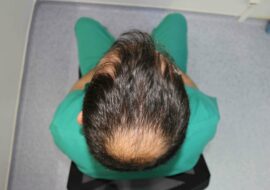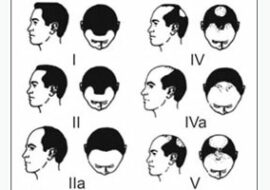Due to the relative difficulty of treatment methods and the long duration before their effect is realised, those affected view hair loss as a permanent affliction. However, that’s simply not the case. Most forms of hair loss can be halted if not treated outright; the trick lies in finding the method that works.
Hair loss is an emotionally distressing condition and many unscrupulous sellers take advantage of the desperation of those affected in order to make money. For this reason, in the entire hair loss treatment industry worth $3.5 billion, 99% of these so-called treatments don’t work at all. It’s a deplorable situation that sees the affected lose huge amounts of money to no avail. You can easily avoid this by knowing what really works.
The thing to keep in mind is that the effectiveness of any treatment option largely depends on early intervention. You should therefore seek treatment as soon as you find any evidence of substantial hair loss. It’s advisable that you seek treatment methods whose effectiveness has been clearly demonstrated and drugs that have been approved by the relevant authorities (e.g. FDA in Northern America).
Medication for hairloss
We have made huge strides when it comes to creating medications for hair loss. There are finally some drugs which have been clinically proven to prevent hair loss and regrow lost hair. Here are some effective drugs you should consider:
- Minoxidil: It was previously used for treatment for high blood pressure. However, minoxidil was largely discontinued due to a very interesting side effect. People using the drug complained about excessive hair growth in unexpected places like the forehead, cheeks and the backs of their hands. Further research into this problem showed that when applied directly to the skin, minoxidil could stimulate hair growth. It has since been repurposed for treatment of hair loss.
Minoxidil is effective for men as well as women and is easily accessible as an over-the-counter (OTC) drug. Different preparations of minoxidil are available including the 2% solution, 4% solution, 5% solution and mousse preparation. However, while clearly effective at regrowing some hair and preventing further hair loss, minoxidil is not a long-term solution. Stopping the drug will immediately resume the hair loss. - Finasteride: This is a drug that has been shown to be very effective for hair loss. Finasteride is taken as a pill and works by preventing the formation of the male hormone dihydrotestosterone (DHT). If taken daily, it reduces the levels of DHT by as much as 60%. This reduces the harmful effect of DHT on hair follicles and preserves your hair making finasteride the go-to drug for men keen on treating androgenetic alopecia. However, while the drug is virtually safe, a few users have experienced temporary sexual side effects such as impotence, loss of libido, swelling and tenderness in the breast and abnormal ejaculations. Dutasteride is a more powerful drug that works the same way as finasteride and can also be used for treatment.
- Xpecia: This is a Turkish product that has been proved to be very effective due to the fact that it also blocks the action of DHT on the hair follicle. Additionally, Xpecia contains an optimum amount of necessary vitamins and minerals for healthy hair. For this reason, not only will this drug stop and reverse hair loss but also improve the quality of your remaining hair.
FUE Hair Transplantation
Hair transplantation is a useful technique when it comes to treating male pattern baldness and Follicular Unit Extraction (FUE) has marked its culmination after several years of evolution. This surgical technique involves harvesting of individual hair follicles or follicular units from donor sites then transplanting them into the balding area of the head. The donor sites are the sides and back of the head because hair located here is extremely resistant to the balding process. Once implanted, the follicular units grow in their new location after several months and can guarantee complete restoration of your natural hairline if done correctly. While FUE is minimally invasive and practically leaves no scars, it demands a very high level of skill from the surgeon.










